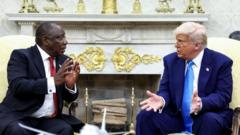**Tensions rise over Donald Trump's claims regarding the safety of white farmers in South Africa as a local farmer provides context for a controversial video.**
**Trump's Misinterpretation of South African Memorial Sparks Controversy**

**Trump's Misinterpretation of South African Memorial Sparks Controversy**
**A farmer clarifies that white crosses displayed by the US President were a memorial—not graves for farmers.**
The recent encounter between US President Donald Trump and South African President Cyril Ramaphosa in the Oval Office has ignited a media storm, particularly regarding the representation of a memorial in South Africa. Trump showcased a video featuring white crosses in KwaZulu-Natal province during their meeting, describing it as a "burial site" for white farmers. However, Rob Hoatson, the individual behind the installation, has asserted that this characterization is inaccurate, clarifying that the crosses served as a temporary memorial to a couple murdered on their farm in 2020.
During a heated dialogue about violence against farmers, Trump used the crosses to support claims that white farmers in South Africa are being systematically targeted, stating, “These are burial sites… over 1,000 of white farmers.” In contrast, Hoatson, the farmer who organized the memorial, emphasized its purpose as a tribute, not a burial ground. He noted the memorial marked the tragic deaths of Glen and Vida Rafferty, their neighbors, tragically killed in August 2020 by convicted murderers.
While the memorial comprised over 2,500 white crosses, Hoatson explained that its intent was to honor the Raffertys, not to claim a broader narrative of racial violence. He criticized Trump for exaggerating facts, although he expressed no objection to the video’s use without his explicit permission.
In the meeting, Ramaphosa acknowledged that violence does exist in South Africa but emphasized that victims of crime are not exclusively white, and that the majority of murder victims are black. He stated, "Criminality in our country is not confined to one race." Critics argue Trump's portrayal may perpetuate misinformation around the pressing issues of violence and crime in South Africa.
The incident has also led to a mixed reaction among South African activists. Some have welcomed Trump's comments as a means to draw attention to the issue, while others criticize the narrative as exaggerated and fueled by misinformation.
As the fallout from the meeting continues, questions remain about the accuracy of claims surrounding violence against farmers and the broader implications on South Africa's international standing.
During a heated dialogue about violence against farmers, Trump used the crosses to support claims that white farmers in South Africa are being systematically targeted, stating, “These are burial sites… over 1,000 of white farmers.” In contrast, Hoatson, the farmer who organized the memorial, emphasized its purpose as a tribute, not a burial ground. He noted the memorial marked the tragic deaths of Glen and Vida Rafferty, their neighbors, tragically killed in August 2020 by convicted murderers.
While the memorial comprised over 2,500 white crosses, Hoatson explained that its intent was to honor the Raffertys, not to claim a broader narrative of racial violence. He criticized Trump for exaggerating facts, although he expressed no objection to the video’s use without his explicit permission.
In the meeting, Ramaphosa acknowledged that violence does exist in South Africa but emphasized that victims of crime are not exclusively white, and that the majority of murder victims are black. He stated, "Criminality in our country is not confined to one race." Critics argue Trump's portrayal may perpetuate misinformation around the pressing issues of violence and crime in South Africa.
The incident has also led to a mixed reaction among South African activists. Some have welcomed Trump's comments as a means to draw attention to the issue, while others criticize the narrative as exaggerated and fueled by misinformation.
As the fallout from the meeting continues, questions remain about the accuracy of claims surrounding violence against farmers and the broader implications on South Africa's international standing.




















